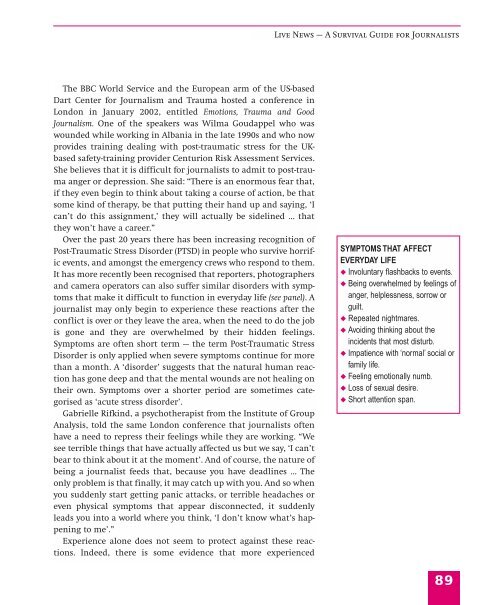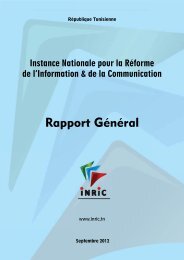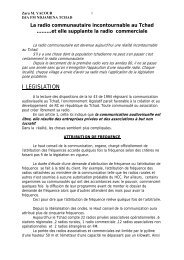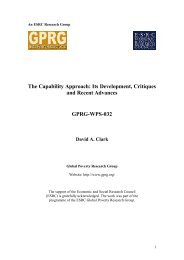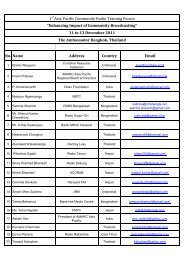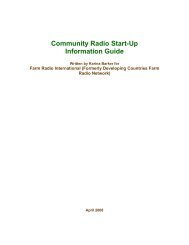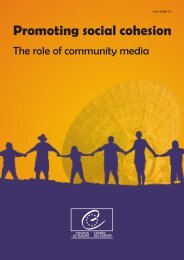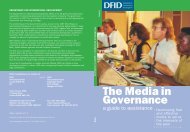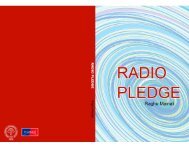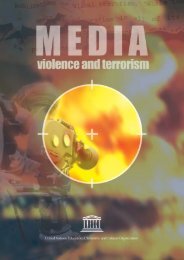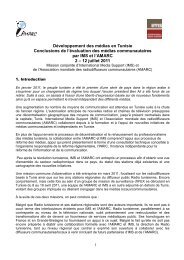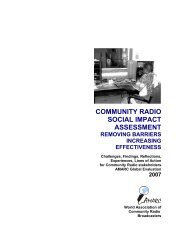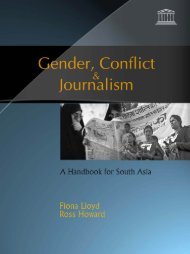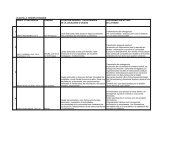Live News - A Survival Guide - International Federation of Journalists
Live News - A Survival Guide - International Federation of Journalists
Live News - A Survival Guide - International Federation of Journalists
- No tags were found...
Create successful ePaper yourself
Turn your PDF publications into a flip-book with our unique Google optimized e-Paper software.
<strong>Live</strong> <strong>News</strong> — A <strong>Survival</strong> <strong>Guide</strong> for <strong>Journalists</strong>The BBC World Service and the European arm <strong>of</strong> the US-basedDart Center for Journalism and Trauma hosted a conference inLondon in January 2002, entitled Emotions, Trauma and GoodJournalism. One <strong>of</strong> the speakers was Wilma Goudappel who waswounded while working in Albania in the late 1990s and who nowprovides training dealing with post-traumatic stress for the UKbasedsafety-training provider Centurion Risk Assessment Services.She believes that it is difficult for journalists to admit to post-traumaanger or depression. She said: “There is an enormous fear that,if they even begin to think about taking a course <strong>of</strong> action, be thatsome kind <strong>of</strong> therapy, be that putting their hand up and saying, ‘Ican’t do this assignment,’ they will actually be sidelined … thatthey won’t have a career.”Over the past 20 years there has been increasing recognition <strong>of</strong>Post-Traumatic Stress Disorder (PTSD) in people who survive horrificevents, and amongst the emergency crews who respond to them.It has more recently been recognised that reporters, photographersand camera operators can also suffer similar disorders with symptomsthat make it difficult to function in everyday life (see panel). Ajournalist may only begin to experience these reactions after theconflict is over or they leave the area, when the need to do the jobis gone and they are overwhelmed by their hidden feelings.Symptoms are <strong>of</strong>ten short term — the term Post-Traumatic StressDisorder is only applied when severe symptoms continue for morethan a month. A ‘disorder’ suggests that the natural human reactionhas gone deep and that the mental wounds are not healing ontheir own. Symptoms over a shorter period are sometimes categorisedas ‘acute stress disorder’.Gabrielle Rifkind, a psychotherapist from the Institute <strong>of</strong> GroupAnalysis, told the same London conference that journalists <strong>of</strong>tenhave a need to repress their feelings while they are working. “Wesee terrible things that have actually affected us but we say, ‘I can’tbear to think about it at the moment’. And <strong>of</strong> course, the nature <strong>of</strong>being a journalist feeds that, because you have deadlines … Theonly problem is that finally, it may catch up with you. And so whenyou suddenly start getting panic attacks, or terrible headaches oreven physical symptoms that appear disconnected, it suddenlyleads you into a world where you think, ‘I don’t know what’s happeningto me’.”Experience alone does not seem to protect against these reactions.Indeed, there is some evidence that more experiencedSYMPTOMS THAT AFFECTEVERYDAY LIFE◆ Involuntary flashbacks to events.◆ Being overwhelmed by feelings <strong>of</strong>anger, helplessness, sorrow orguilt.◆ Repeated nightmares.◆ Avoiding thinking about theincidents that most disturb.◆ Impatience with ‘normal’ social orfamily life.◆ Feeling emotionally numb.◆ Loss <strong>of</strong> sexual desire.◆ Short attention span.89


